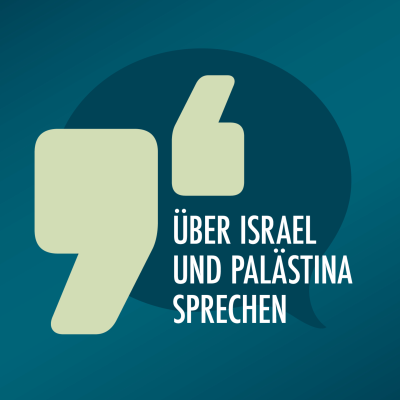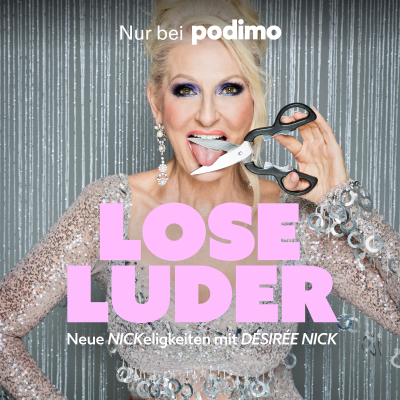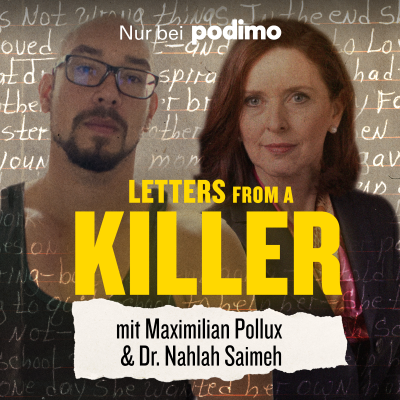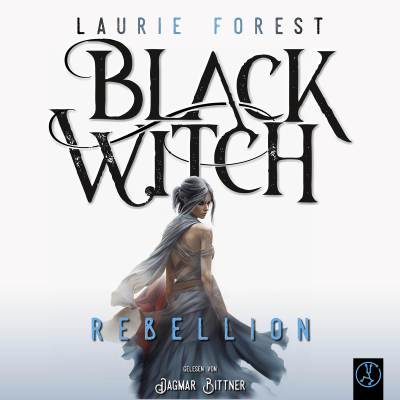
Über Israel und Palästina sprechen
Deutsch
Gratis en Podimo
Kostenlos hören bei Podimo
Starte jetzt und verbinde dich mit deinen Lieblingspodcaster*innen
- Vertraut von über 1 Mio. deutschen Hörer*innen
- Über 1.000 lokale Podcasts und Shows – nur bei Podimo
- Keine Zahlung nötig
Mehr Über Israel und Palästina sprechen
Willkommen bei 'Über Israel und Palästina sprechen', dem Podcast, der die Vielfalt der Meinungen zu diesem komplexen Thema in unserer deutschen Gesellschaft hörbar macht. Begleitet uns auf einer Reise durch Perspektiven von Expert:innen, Lehrkräften und Pädagog:innen – mit und ohne Betroffenheitsperspektive – und taucht ein in den facettenreichen Nahostkonflikt. Ein Podcast der gemeinnützigen Gesellschaft im Wandel UG. Impressum: https://www.israelpalaestinavideos.org/impressum/
Alle Folgen
95 FolgenSpecial: Witnessing and Resistance — Yuli Novak on Justice and Human Rights
In this episode, I speak with Yuli Novak, Executive Director of B’Tselem, Israel’s leading human rights organization documenting and opposing state violence and apartheid in the Palestinian territories. Yuli is among the few public voices in Israel who continue to insist on accountability and equality as civil society faces unprecedented pressure. Before joining B’Tselem in 2023, she served as Executive Director of Breaking the Silence, leading the publication of soldiers’ testimonies from the occupied territories — work that made her a frequent target of political attacks. Her memoir Who Do You Think You Are traces her journey from Israeli Air Force officer to outspoken critic of militarism and Jewish supremacy. In our conversation, Yuli explains why B’Tselem has now named Israel’s actions in Gaza as genocide, and describes how decades of occupation and apartheid have created a society increasingly desensitized to violence. She also reflects on becoming a parent during this political moment and how personal responsibility fuels her activism. We discuss international solidarity, the shrinking space for dissent, and the role queer and feminist activism can play in resisting systems of domination. Guest: Yuli Novak Host: Shai Hoffmann Links: https://www.btselem.org/node/215035 https://www.medico.de/blog/wenn-nie-wieder-jetzt-ist-20208 [https://www.medico.de/blog/wenn-nie-wieder-jetzt-ist-20208] https://www.spiegel.de/ausland/israel-menschenrechtsorganisation-begruesst-deutschen-lieferstopp-a-90bd7e19-07e0-4396-8851-664f5dc202e6 [https://www.spiegel.de/ausland/israel-menschenrechtsorganisation-begruesst-deutschen-lieferstopp-a-90bd7e19-07e0-4396-8851-664f5dc202e6] https://www.youtube.com/watch?v=N9eASwQIq40 [https://www.youtube.com/watch?v=N9eASwQIq40] https://www.theguardian.com/profile/yuli-novak Special thanks to OFEK: The Israeli Center for Public Affairs, Jordi Kuragari (video snippets), Lea Volz and 365 Sherpas (editorial), Simon Eichinger (post-production). This podcast is a project by Gesellschaft im Wandel gGmbH and funded by the Robert Bosch Stiftung. If you enjoyed this episode, feel free to share it around!
Special: Bridging Faith and Justice — Limor Yaakov‑Safrai from Smol Emuni on Building the Faithful Left
In this episode, I speak with Limor Yaakov-Safrai, Israeli educator and CEO of the HaSadeh Association, focused on faith-based humanistic education. Limor grew up in Gush Katif in Gaza, a religious settlement evacuated in 2005, and now lives in the religious kibbutz Ma’ale Gilboa. She is also a co-founder of Smol Emuni (“Faithful Left”), a movement advocating for justice, equality, and coexistence through religiously grounded progressive values. We discuss her work in education, her approach to activism within religious communities, the challenges of promoting democratic values, and her vision for social change in Israel, including relations with Palestinians. This conversation highlights the intersection of faith, education, and social justice in times of political polarization. Guest: Limor Yaakov-SafraiHost: Shai Hoffmann Links: https://north.mandelfoundation.org.il/english/fellows/pages/default.aspx [https://north.mandelfoundation.org.il/english/fellows/pages/default.aspx] https://www.instagram.com/p/DRxMpuSAmBA/ [https://www.instagram.com/p/DRxMpuSAmBA/] https://www.timesofisrael.com/under-shadow-of-war-conference-of-left-wing-religious-jews-grows-its-numbers/ [https://www.timesofisrael.com/under-shadow-of-war-conference-of-left-wing-religious-jews-grows-its-numbers/] https://www.jpost.com/israel-news/article-867028 Special thanks to OFEK: The Israeli Center for Public Affairs, Marisa Raiser and 365 Sherpas (editorial), Jordi Kuragari (video snippets), Simon Eichinger (post-production) Thanks for tuning in — don’t forget to subscribe and share!
Special: Palästinensische Familien stärken in Nazareth – Nabila Espanioly über Aktivismus und Bildung
In dieser Folge spreche ich mit Nabila Espanioly, palästinensische Bürgerin Israels, Psychologin, Sozialarbeiterin, Feministin und Friedensaktivistin. Sie leitet das Al-Tufula Center in Nazareth, das frühkindliche Bildung und Frauenförderung unterstützt. Nabila wuchs in einer palästinensisch-christlichen Familie auf, studierte Sozialarbeit in Haifa und Psychologie in Deutschland und ist seit Jahrzehnten in Hadash/Jabha und feministischen Bewegungen aktiv. Wir sprechen über ihre frühen Erfahrungen, ihr Engagement und die Arbeit, Brücken zwischen Gemeinschaften zu bauen. Wir werfen außerdem einen Blick auf das Al-Tufula Center, seine Entwicklung und die aktuellen Herausforderungen für palästinensische Kinder und Familien, besonders nach dem 7. Oktober 2023. Nabila teilt ihre Hoffnungen und die Bedeutung von Bildung und Empowerment. Ein besonderer Dank an OFEK: The Israeli Center for Public Affairs, Simon Eichinger (Postproduktion), Marisa Raiser und 365 Sherpas (Redaktion) sowie Jordi Kuragari (Video-Snippets) Dieser Podcast ist ein Projekt der Gesellschaft im Wandel gGmbH und wird von der Robert Bosch Stiftung gefördert. Danke, dass ihr dabei wart – abonniert und empfehlt den Podcast weiter! Links: https://www.instagram.com/nabilaesp https://altufula.org/en/files/userfiles/identity%20.pdf [https://altufula.org/en/files/userfiles/identity%20.pdf] https://altufula.org/en https://www.bpb.de/mediathek/reihen/stimmenvielfalt-aus-israel/322068/nabila-espanioly/ [https://www.bpb.de/mediathek/reihen/stimmenvielfalt-aus-israel/322068/nabila-espanioly/] https://klinken.rosalux.de/objekte/al-tufula-center [https://klinken.rosalux.de/objekte/al-tufula-center] https://en.wikipedia.org/wiki/Nabila_Espanioly [https://en.wikipedia.org/wiki/Nabila_Espanioly] https://www.rosalux.org.il/autoren/nabila-espanioly/ [https://www.rosalux.org.il/autoren/nabila-espanioly/]
Special: Law, Loss, and Accountability — A Conversation with Ziv Stahl from Yesh Din
In this episode, I speak with Ziv Stahl, the Executive Director of Yesh Din, an Israeli human rights organization that documents and challenges violations against Palestinians in the occupied West Bank. Ziv holds a Master in political science and is considering herself an activist, Ziv is one of the few public voices in Israel who continue to insist on accountability, equality, and the rule of law at a time when democratic space is shrinking and violence is escalating. Ziv’s commitment to human rights is shaped by profound personal loss. She grew up in Kibbutz Kfar Aza and survived the Hamas attack on October 7, 2023, during which her sister-in-law, was killed. Despite this trauma, she has chosen to continue her work — refusing to abandon the belief that justice must apply universally, even in moments of national grief. Under Ziv’s leadership, Yesh Din works to expose and challenge systemic impunity for settler and military violence in the West Bank through legal documentation, petitions, and public advocacy. In this conversation, we talk about her personal journey, the limits of legal protection for Palestinians, and what it means to defend human rights in a society where dissent is increasingly unpopular. We also discuss the role of international accountability, the pressures facing civil society, and the moral clarity required to continue this work despite fear, hostility, and political backlash. Thanks for listening — subscribe and share! Guest: Ziv StahlHost: Shai Hoffmann Special thanks to OFEK: The Israeli Center for Public Affairs, Lea Volz and 365 Sherpas (editorial), Jordi Kuragari (video snippets), Simon Eichinger (post-production) Links: https://www.zeit.de/politik/2024-10/hamas-massaker-israel-ziv-stahl-palaestinenser-rechte https://www.blaetter.de/ausgabe/2024/januar/israels-zivilgesellschaft-zerrieben-zwischen-den-extremen https://nifcan.org/ziv-stahl/ https://www.youtube.com/watch?v=_l87o1XvLb8 https://www.faz.net/aktuell/politik/krieg-in-nahost/deutschland-blockiert-hilfsgelder-fuer-israelische-ngo-19337943.html https://www.haaretz.com/israel-news/2025-10-23/ty-article-static/.premium/erased-isr[…]unities-in-the-west-bank/00000199-4787-d6e0-a7fb-cfcfd0400000 https://www.haaretz.com/israel-news/2025-10-30/ty-article-magazine/.highlight/israel[…]-on-decline-of-democracy/0000019a-3629-ddf1-a1db-fefd25ee0000
Journalist Felix Tamsut: Die politische Sprengkraft der mizrahischen Erfahrung
In dieser Folge spreche ich mit Felix Tamsut, Journalist der Deutschen Welle, der seit vielen Jahren über Israel und Palästina berichtet und selbst aus einer marokkanisch-tunesisch-jüdischen Mizrahi-Familie stammt. Seine Perspektive – obwohl rund die Hälfte der jüdischen Israelis Mizrahim sind – kommt im deutschsprachigen Diskurs bis heute kaum vor. Wir sprechen über die innenisraelischen Spannungen, die das Land seit seiner Gründung prägen, und über die Geschichte arabischer Juden*Jüdinnen, deren Erfahrungen im europäisch geprägten Zionismus lange ignoriert oder abgewertet wurden. Gemeinsam analysieren wir, wie strukturelle Benachteiligung entsteht – auch dann, wenn sie eine große Bevölkerungsgruppe betrifft. Ein Schwerpunkt ist der politische Umbruch von 1977, als Menachem Begin mit der neu gegründeten Likud-Partei die jahrzehntelange Frustration vieler Mizrahim bündelte und damit Israels politische DNA nachhaltig veränderte. Wir blicken zudem auf Deutschland: Wie arabische Juden*Jüdinnen hier instrumentalisiert werden, welche Narrative verkürzt sind und warum diese Debatten die Komplexität mizrahischer Identitäten häufig unsichtbar machen. Ein Gespräch voller analytischer Schärfe und biografischer Tiefe – über Geschichte, Macht, Identität und die blinden Flecken unserer Debatten. Eine Folge, die Perspektiven verschiebt. Gast: Felix Tamsut Moderator: Shai Hoffmann Weitere Infos zu Felix Tamsut: Amram: https://www.instagram.com/amrm_ngo?igsh=MWp1b3ZuamxueGxsNA== [https://www.instagram.com/amrm_ngo?igsh=MWp1b3ZuamxueGxsNA%3D%3D] Was dachten sich die “founding fathers” Israel’s über die Mizrahis: https://www.haaretz.co.il/magazine/2014-02-13/ty-article/.highlight/0000017f-dc1f-db22-a17f-fcbfb4740000 [https://www.haaretz.co.il/magazine/2014-02-13/ty-article/.highlight/0000017f-dc1f-db22-a17f-fcbfb4740000] Die Rede von begin: https://youtu.be/AXJCH-UzQbo?si=BmewKu1mvMscamWu [https://youtu.be/AXJCH-UzQbo?si=BmewKu1mvMscamWu] Nordafrikanische Juden im Holocaust: https://www.yadvashem.org/articles/general/the-jews-of-north-africa.html [https://www.yadvashem.org/articles/general/the-jews-of-north-africa.html] Marokko: https://www.smithsonianmag.com/history/the-moroccan-sultan-who-protected-his-countrys-jews-during-world-war-ii-180983903/ [https://www.smithsonianmag.com/history/the-moroccan-sultan-who-protected-his-countrys-jews-during-world-war-ii-180983903/] Ein besonderer Dank geht an Simon Eichinger für die Postproduktion, an Jordi Kuragari für die Video-Snippets, an 365 Sherpas und die Redaktionskoordinatorin Lea Volz für die Unterstützung. Vielen Dank fürs Zuhören – abonniert den Podcast und teilt ihn gerne weiter!















































